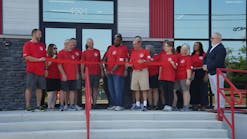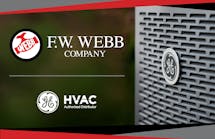William Cullen, a Scottish physician, chemist and agriculturalist at the University of Glasgow in Scotland, created the first known refrigeration system in 1756, according to Wikipedia.org. The website says he used a pump to create a vacuum over a container of diethyl ether, which then boiled and absorbed heat from the surrounding air. From that point, further experimentation evolved until refrigeration was being commercially used in the mid-1800s in railroad cars and in breweries.
From its invention, refrigeration has been a complex subject. It's expensive to use, operate and maintain. It was developed by chemists, so it's not exactly the easiest thing to maintain and repair. Several different kinds of refrigerants, refrigerant blends and refrigerant alternatives are on the market today. With so many different aspects of refrigeration, it's no wonder HVACR technician hopefuls aren't all vying for top-in-class at the local refrigeration university.
HVACR Distribution Business magazine spoke with Mark Lowry, executive vice president at Refrigeration Service Engineers Society (RSES) and Frank Meier, president and CEO of Meier Supply in Johnson City, NY, about the need for new recruits in the refrigeration industry. The refrigeration sector suffers the same plight as the rest of the HVACR industry, in that there's been a shortage of people entering the trade, Lowry says.
“The average age of RSES members specializing in refrigeration is 62 years old — an indication that soon these individuals will retire,” Lowry explains. “Once that collective wisdom is gone, the priceless mentoring potential within that group of experienced technicians is lost to the new entrants we have.”
“Refrigeration is not a glamorous industry; therefore, it's hard to attract people to it. The wholesale distribution side finds it even more difficult to attract good talent,” Meier adds.
The reason it's difficult to attract good talent is that refrigeration is substantially more technical than air conditioning, he explains. “With air conditioning, desired temperature and humidity are fairly consistent; only two refrigerants are used the majority of the time, R-22 and R-410A. In the refrigeration part of the industry, you've got temperatures ranging from -40F to 40F, as well as 10 to 12 different refrigerants to choose from.”
“To be successful in refrigeration, you have to be good at many different fields, not just HVAC. You need to know plumbing to do the brazing, and electrical to do troubleshooting,” Meier adds.
Training is Key
At RSES, Lowry explains, they teach the technicians that refrigeration is generally much more precise than residential air conditioning, due to the perishable nature of the products. “In order to maintain a tighter temperature and humidity range, technicians truly must understand what's happening inside the system. There's a smaller margin for error, and ‘parts changers’ don't do well as technicians in that arena. If you have an uncomfortable homeowner for a few days, it's obviously not good, but a warm freezer full of melted ice cream is a huge loss of revenue to a supermarket owner.”
In addition to searching area refrigeration technical schools for recruits, most companies are training their technicians in-house as well as completing RSES training. Meier Supply Co. considers training a top priority.
Page 2 of 2
“In our case, we give bonuses to our employees for attending RSES training. Our specialty is refrigeration, so it's extremely important to us that our guys are better trained than anyone else. We focus on RSES training, but we also have an in-house trainer. We hired him to start training internally, and he's been so successful, that he's started to train our customers, too. There are a few manufacturers that are really good at training as well. Both manufacturers and wholesalers that we work with are good at training our technicians,” Meier explains.
Although RSES has a big focus on refrigeration, it doesn't specifically promote one industry over another. “Most of our efforts talk about the industry as a whole, since all sectors need an influx of individuals in order to address the shortage of technicians,” Lowry says.
“RSES, along with other associations like ACCA, AHRI, HARDI, HRAI, NATE and PHCC-NA, collaborate on promoting instructional excellence through efforts like the HVACR and Mechanical Instructor Workshop (www.instructorworkshop.org). Much of the focus is on the larger HVAC sectors, so we need to do a better job addressing refrigeration and its unique requirements going forward,” Lowry explains. “RETA (Refrigerating Engineers & Technicians Assn.) does do an excellent job promoting and training refrigeration contractors that specialize in large industrial refrigeration systems that use ammonia as the refrigerant.”
There is Hope
Business owners continue to look to technical colleges and high schools for new recruits. A positive sign is that very successful refrigeration programs are available to HVACR technician hopefuls. Jeryll A. McWhorter, executive director, Sustainable Technologies Academy/Commercial Refrigeration at DeKalb Technical College in Clarkston, GA, considers his commercial refrigeration program as thriving. “We've had the benefit of being supported by a very active advisory board that has donated equipment and expertise, which included giving guest lectures on a host of subjects.
“The industry has played a major role in assisting in setting up the commercial refrigeration laboratory and in providing guidance in the curriculum from the very start,” he adds. “There's been unprecedented industry support for the programs, as all major refrigeration equipment manufacturers and contractors in the Atlanta area are involved. The refrigeration lab and classrooms now include supermarket cases, walk-in coolers and freezers, glycol-based units, a rack room, a four-compressor rack trainer as well as other features.”
DeKalb Technical College currently has 62 non-duplicated students enrolled in the commercial refrigeration program, which doesn't include the 235 students enrolled in the residential air-conditioning program, and the additional 62 enrolled in the building automation systems program.
The program encourages local refrigeration contractors to offer internships to the students. “The last course our students take in the program is an internship. Local contractors such as Atlanta Refrigeration and T&O Refrigeration have accepted students as interns and even hired some of them,” McWhorter adds.
For the refrigeration industry to attract new contractors, the HVACR industry as a whole needs to work together to communicate the opportunities available to technicians. “We all need to do a much better job recruiting new workforce entrants,” Lowry concludes.
“The trade offers excellent career opportunities, and we need to communicate that message to society as a whole. Between high school graduates choosing post-secondary educational options and the number of displaced workers seeking a second career, there certainly isn't a shortage of potential candidates. We need to better communicate what job opportunities are available, as well as communicate the need for proper education and training in order to be prepared to succeed in those jobs.”
If the trend in technical schools continues as it has at DeKalb Technical College, the chill that most recruiters feel when trying to find good help may finally start to warm up.
Kate Kelly is associate editor with Contracting Business magazine. Contact her at 216/931-9755 or[email protected].









